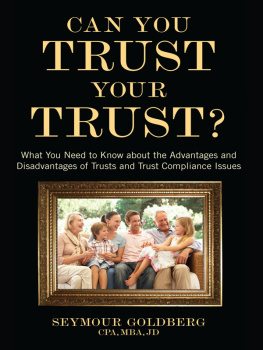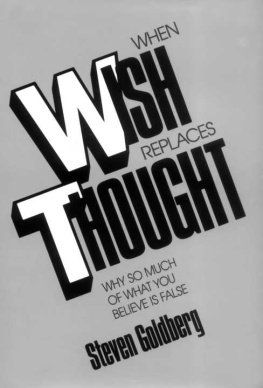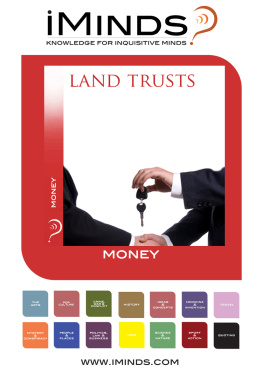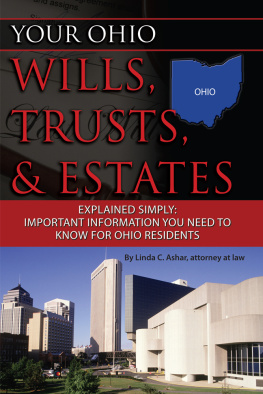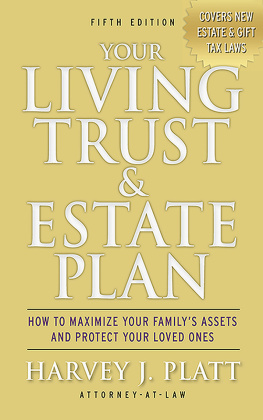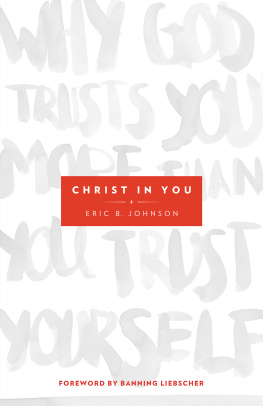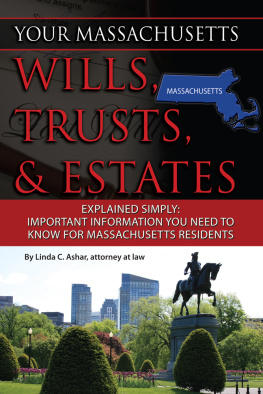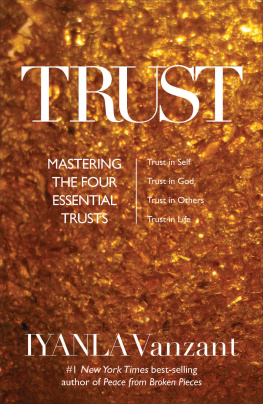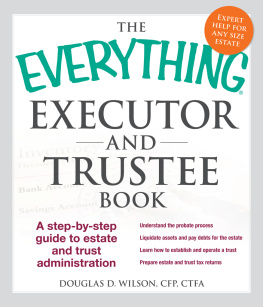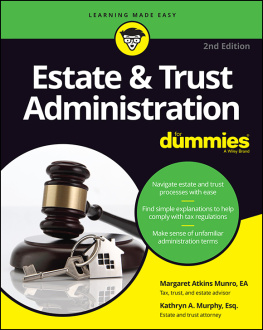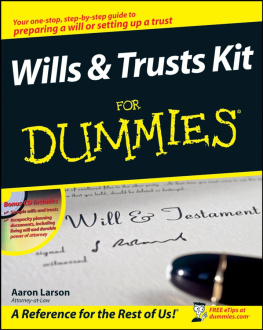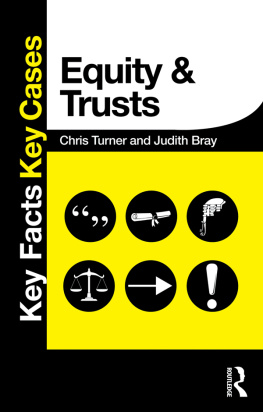CAN YOU TRUST YOUR TRUST?
What You Need to Know about the Advantages and Disadvantages of Trusts and Trust Compliance Issues
SEYMOUR GOLDBERG
CPA, MBA, JD
Contents
Appendix A
Uniform Trust Code
Appendix B
Uniform Principal and Income Act
Appendix C
A Unitrust Court Case in New York State
About the Author
SEYMOUR GOLDBERG , CPA, MBA, JD, is a senior partner in the law firm of Goldberg & Goldberg, PC, in Woodbury, New York. He is professor emeritus of law and taxation at Long Island University. Mr. Goldberg is the recipient of the American Jurisprudence Award in Federal Estate and Gift Taxation from St. Johns University School of Law. As an instructor for the Foundation for Accounting Education and the American Institute of Certified Public Accountants, Mr. Goldberg has taught many CPE courses in taxation and trust accounting at the state and national levels and has taught CLE courses for the New York State Bar Association, local bar associations, and law schools. He is the recipient of outstanding discussion leader awards from both the American Institute of Certified Public Accountants and the Foundation for Accounting Education. He was formerly associated with the Internal Revenue Service. Mr. Goldberg has been quoted in the New York Times , Forbes , Fortune , Money Magazine , U.S. News & World Report , Business Week , The Wall Street Journal , and the Tax Hotline . He has also been interviewed on CNN, CNBC, and WCBS. Mr. Goldberg has also served as a member of the IRS Long Island Tax Practitioner Liaison Committee and the Northeast Pension Liaison Group. He has been involved in conducting continuing education outreach programs with the IRS. Mr. Goldberg has authored manuals for the American Bar Association, American Institute of Certified Public Accountants, and other organizations.
Overview
This book is written because of the expanding use of trusts in this country. A trust is frequently looked at as the alter ego of a will. Trusts are often worthwhile but can be a devastating nightmare if they are administered improperly. Unfortunately, trust litigation is expanding, and challenges to the actions of trustees by beneficiaries are the subject of continuing education programs by the American Bar Association and other bar associations.
As a result of the revamping of state trust laws in many states, trustees will find themselves with headaches. This guide will advise you on the benefits as well as the pitfalls of acting as a trustee.
Authors Note
Throughout this book, there is reference to the Uniform Principal and Income Act (UPAIA) and the Uniform Trust Code (UTC). The states can adopt these uniform acts, which control to a major extent the rules that apply to the administration of trusts that are governed by a particular states trust law.
Most states have adopted versions of the UPAIA with various effective dates. A number of states have adopted versions of the UTC with various effective dates as well.
The UPAIA covers the determination of what is income and what is principal under the state trust law for trust accounting purposes. For the most part, these rules do not follow the IRS income tax rules.
The UTC covers many technical issues that come up in the administration of a trust other than the trust accounting income and principal rules.
TRUSTEE HEADACHES IN GENERAL
Being selected as a trustee is considered by many to be both an honor and a privilege. It also means authority and power. Obviously, any discretion delegated to a trustee must be exercised in a proper manner and in an impartial way. Naturally, holding the position of a trustee will also result in trustee commissions to the trustee.
The problems facing a trustee may take place in a silent and strange way. As an author, I have found that trustees face unforeseen difficulties. In many instances, the difficulties are thrust upon the trustee without the trustees knowledge.
One point that must be emphasized is the need for the trustee to read the trust instrument. The trust document may be five pages long or 50 pages long. In any event, the document must be read and understood.
I suggest that the individual trustee should read the trust document several times and then have it explained by a knowledgeable trust attorney.
Often, the trustee looks at the trust document and may not fully understand the provisions it contains. If the trustee does not follow the terms of the trust document, then he or she has made a first mistake. This mistake can subject the trustee to problems with the trust beneficiaries at a later date.
CHANGING TRUST LAWS
Perhaps the next headache for a trust is the fact that there are periodic revisions of the state trust laws that often clarify, expand, or change the obligations of a trustee. Unfortunately, many trustees are not experts in trust law and may not know that the trust laws in their state have changed. The trustee may be a successful businessperson or professional, but he or she may not have the time or the inclination to study the trust document or meet with a trust attorney from time to time to determine his or her trustee obligations. Many trust documents are extremely complex.
In general, once the trust is activated, the trustee tends to go it alone and assumes that the state trust laws remain constant. However, state trust laws do not remain constant. In addition, the courts are constantly interpreting the meaning and the terms of trust documents, especially if the document is confusing and ambiguous.
Often, the trust beneficiaries haul the trustee into court because they feel that they have been shortchanged and treated unfairly.
Trust litigation and estate litigation is big business. Catching a sleepy and sloppy trustee on technical violations is not a difficult assignment for an experienced trust litigator.
A significant problem for a trustee exists when he or she relies on an adviser who may not know that the state trust laws have been changed or modified in the state that determines the interpretation of the trusts provisions.
Many states have adopted, for example, a revised version of the Uniform Principal and Income Act (UPAIA). These trust laws for the most part apply to existing trusts and newly formed trusts as well. The trust laws of the particular state must be checked in order to determine the effective date of the UPAIA in that particular state. The UPAIA defines how accounting income and principal are determined. It also explains how disbursements are treated and whether the disbursements are payable from income or principal. Other state trust laws often describe how certain trust disbursements are treated as well. The UPAIA defines certain receipts in a manner that is different from the normal definition of income. Whenever the word state is used in this manual, it includes the District of Columbia.
A suggested version of the UPAIA is initially drafted by the National Conference of Commissioners on Uniform State Laws. The states then consider whether to adopt the UPAIA in whole, in part, or not at all. Most states have adopted versions of the UPAIA with various effective dates. Periodically, the state modifies its existing trust accounting rules prospectively. This can be a nightmare if the trustee is not aware of the changes and operates under the old set of the trust accounting rules.
The UPAIA has a profound effect on a trust that states that the income from the trust must be paid to the income beneficiary of the trust since there are certain definitions regarding the determination of income under trust law. Income under trust law is not the same as income from an IRS point of view.

